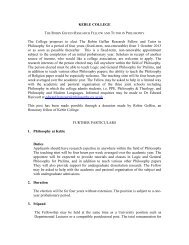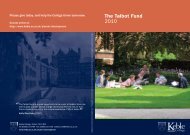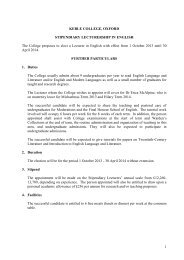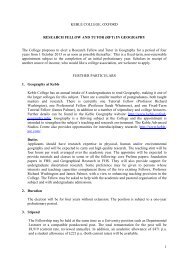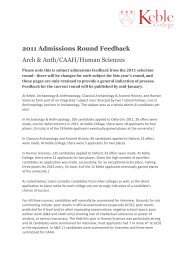The Record 2006 - Keble College - University of Oxford
The Record 2006 - Keble College - University of Oxford
The Record 2006 - Keble College - University of Oxford
You also want an ePaper? Increase the reach of your titles
YUMPU automatically turns print PDFs into web optimized ePapers that Google loves.
Old Members at Work<br />
<strong>The</strong> <strong>College</strong> at Large<br />
Andrew Bunbury (1962)<br />
Soon after graduating in 1965,<br />
Andrew Bunbury (1962), left<br />
England for Uganda, where he<br />
obtained a Diploma in Education<br />
at Makerere <strong>University</strong>. He<br />
has spent most <strong>of</strong> his working<br />
life working in or on behalf<br />
<strong>of</strong> developing countries. He is<br />
currently employed as Programme<br />
Manager for Save the Children’s<br />
Programme in Tibet.<br />
For all children; All for children; For children’s all<br />
This slogan, displayed in Chinese in many staff rooms in Tibetan<br />
schools, accords precisely with the approach <strong>of</strong> Save the Children<br />
(SC), as promoted in Tibet and other parts <strong>of</strong> China. Benefits that the<br />
programme brings should be available to all children, regardless <strong>of</strong><br />
gender, race, location, religion, or mental or physical ability. <strong>The</strong> focus<br />
<strong>of</strong> the programme, while bringing benefits to communities at large,<br />
will always be on children; and programme activities take an holistic<br />
approach to meeting the needs <strong>of</strong> children.<br />
Despite the fact that the Chinese Government has targeted the Tibet<br />
Autonomous Region (TAR) for assistance, the TAR remains one <strong>of</strong> the<br />
poorest regions <strong>of</strong> China. Around one million people are considered<br />
to be ‘absolutely poor’, with per capita annual income below US$130.<br />
Deprivation is particularly apparent in the rural areas and small towns.<br />
<strong>The</strong> Regional Government’s development strategy assumes that ‘basic<br />
modernization’ will not be achieved until the middle <strong>of</strong> the century.<br />
<strong>The</strong>re has been massive investment in infrastructural projects, which<br />
has provided some local short term employment, but a huge proportion<br />
<strong>of</strong> such investment finds its way back to Inner China or overseas.<br />
China is a signatory to the Convention <strong>of</strong> the Rights <strong>of</strong> the Child (only<br />
Somalia and USA are not) and governmental institutions in TAR are<br />
fully committed to the principles <strong>of</strong> the convention. <strong>The</strong> realization<br />
<strong>of</strong> children’s rights underpins the whole approach <strong>of</strong> SC, which has<br />
been working in Tibet since 1990, implementing programmes intended<br />
to ensure the basic rights <strong>of</strong> children in rural areas to high quality<br />
education and health care. Activities in SC’s Education Programme<br />
primarily consist <strong>of</strong> training primary school teachers and government<br />
partners. <strong>The</strong> aim is to encourage greater community involvement<br />
in supporting local schools, to make schools more child-friendly and<br />
to encourage child-centred, participative learning rather than the<br />
traditional ‘chalk and talk’ approach. An essential component <strong>of</strong> the<br />
programme consists <strong>of</strong> promoting the protection <strong>of</strong> children from<br />
abuse, whether physical, sexual or emotional, and from ill health.<br />
SC’s Health Programme comprises a Water & Sanitation component<br />
(installing community managed clean water systems accompanied by<br />
health/hygiene promotion activities in the communities concerned),<br />
Mother and Child Health promotion, and raising awareness <strong>of</strong> HIV/<br />
AIDS in communities and schools.<br />
We are increasingly seeking ways linking different parts <strong>of</strong> our<br />
programme. <strong>The</strong>re are various reasons for adopting a more integrated<br />
approach, perhaps the most important <strong>of</strong> these being that it will enable<br />
37




